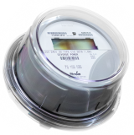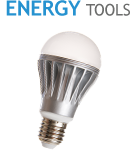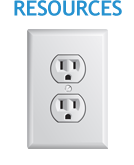Outage Safety
Before the Storm
High winds, hurricanes, tornadoes, and ice storms can lead to unavoidable power outages. There are a variety of measures you can take to make your home more comfortable and safe in the event that the electricity goes out. Here, Diverse Power Incorporated (DPI) share a few tips to help prepare your home before a storm strikes, and measures to take if a power outage does occur.
1) Assemble an emergency kit. It should include a battery-powered radio, a flashlight and candles, extra batteries, a first-aid kit, a fire extinguisher, bottled water and non-perishable food.
2) Keep an emergency supply of fuel or wood handy. For safety, always store fuel in a dry place away from the house.
3) Stock up on blankets. They will not only keep you warm, you can hang them over windows and doorways to minimize heat loss.
If the power does go out
1) Check your fuses, see if the neighbors have lost their power, too, and then call DPI. You can also use our online form to report an outage.
2) Keep refrigerator and freezer doors shut. A closed refrigerator will stay cold for up to 12 hours.
3) Open faucets slightly so they drip; this prevents pipes from freezing.
4) Leave on one light switch so you’ll know when power is restored. Unplug other appliances so they aren’t damaged when the power comes back on.
5) Remember: Never burn charcoal indoors. If you’re using a kerosene or other fuel-burning heater, use it in a well-ventilated area.
6) If you have a back-up generator, equip it with a double-throw switch that will disconnect your home’s circuits from your utilities. If you turn on the generator, throw the switch.
Generator Safety
1) Thoroughly read and follow the manufacturer’s instructions to avoid dangerous shortcuts and ensure the safe operation of your generator
2) Set it up outside, away from all open windows, including neighbors’ windows, to prevent deadly exhaust from entering a home or business
3) Use a heavy-duty extension cord rated for outdoor use to keep the generator safely outdoors. If the appliance has a three-prong plug, always use a three-prong extension cord
4) Consider using a battery-operated carbon monoxide alarm to be alerted if carbon monoxide levels become dangerous
5) Connect appliances directly to it. Do not wire your generator directly to your breaker or fuse box, because the power you generate may flow back into power lines and cause severe injuries, or even kill a neighbor or utility crew working to restore power
6) Turn off all connected appliances before starting your generator
7) Turn connected appliances on one at a time, never exceeding the generator’s rated wattage
8) Don’t touch a generator if you are wet or are standing in water or on damp ground
9) Never refuel a hot generator or one that is running – hot engine parts or exhaust can ignite gasoline
10) Ensure you have plenty of gas for operation stored safely in gas containers
11) Don’t leave a running generator unattended; turn it off at night and when away from home
Tip: Refrigerators may only need to run a few hours a day to preserve food. Try to maintain 40 degrees in the refrigerator compartment and zero degrees in the freezer.
Downed Power Line Safety
1) After a storm, limbs and debris may hide an electrical hazard. Treat all downed power lines as if they are energized.
2) Just because power lines are damaged does not mean they are dead. Stay far away, and keep others away from them.
3) Safe Electricity advises everyone to be mindful of the electrical hazards that storms and flooding can leave behind.
4) If you are driving and come upon a downed power line, stay in your vehicle, warn others to stay away, and contact emergency personnel or the electric utility. Never drive over a downed line. A downed line causes other things around it to become potentially hazardous.
Flooding Safety
1) Never turn off power at the breaker box if you have to stand in water to do so.
2) Never step into a flooded basement. Water may be in contact with electrical outlets or appliances.
3) Never touch electrical appliances, cords or wires while you are wet or standing in water.
4) Do not use water-damaged electronics or appliances until a professional has verified that they are safe.
5) Never drive into flooded waters.
6) Keep electric tools and equipment at least 10 feet away from wet surfaces. Do not use electric yard tools if it’s raining or the ground is wet.






